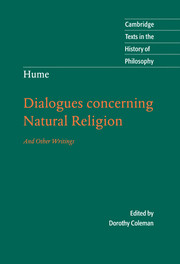Introduction
Published online by Cambridge University Press: 05 June 2012
Summary
David Hume's Dialogues concerning Natural Religion (1779) is one of the most influential works in the philosophy of religion and the most artful instance of philosophical dialogue since the dialogues of Plato. Some consider it a successful criticism of rational theology, some find it a failure, others regard it as a defense of some form of natural religion, and yet others emphasize its influence on the development of fideism, religious belief that disclaims rational justification. The great eighteenth-century historian, Edward Gibbon, said that of all Hume's philosophical works it is “the most profound, the most ingenious, and the best written.” All readers, regardless of their final assessments, can appreciate its penetrating analyses as well as its entertaining wit and ironic humor.
The topic of the Dialogues is natural religion, that is, religious belief, sentiment, and practice founded on evidence that is independent of supernatural revelation. The work presents a fictional conversation among three friends – Cleanthes, Philo, and Demea – that is overheard and later narrated by Pamphilus, Cleanthes' pupil, to his friend Hermippus. Although the names of the characters come from antiquity, the temporal setting is an eighteenth-century one, and the main characters represent philosophical or religious types. They all profess, for different reasons, that the existence of God is evident; but Philo, a skeptic, and Demea, an orthodox theist, urge that the nature of God is incomprehensible, while Cleanthes, an empirical theist, dismisses their skepticism as excessive.
- Type
- Chapter
- Information
- Hume: Dialogues Concerning Natural ReligionAnd Other Writings, pp. xi - xlPublisher: Cambridge University PressPrint publication year: 2007
- 1
- Cited by

